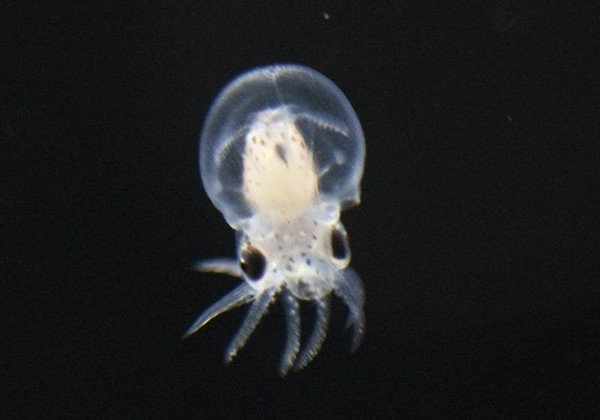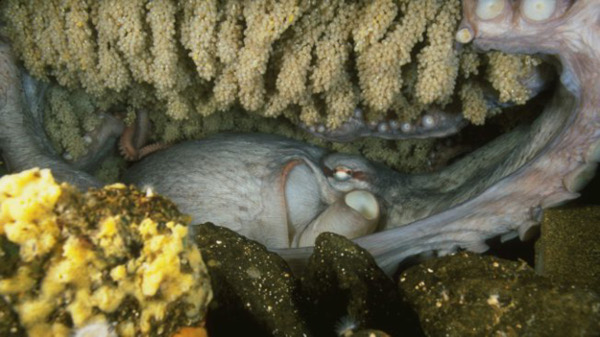Natures Best Mother - The Great Pacific Octopus
G'day Team,
Team, meet the Giant Pacific Octopus (Enteroctopus dofleini), one of the most dedicated mothers in nature.
The life of the Giant Pacific Octopus starts here, as a tiny little blob in an endless black ocean...

[A Cute Baby E. dofleini]
...and yet throughout it's (roughly) four-year lifespan this octopus will grow to an enormous size, with some individuals having been recorded to reach 272kg (600b). Though most individuals grow to only 50kg (110lb) this still makes them the largest species of octopus in our oceans.

In order to grow to such tremendous sizes, the Giant Pacific Octopus follows a strictly carnivorous diet subsisting off crustaceans, mollusks, fish and occasionally sharks.

After growing to full size the Giant Pacific Octopus will find a partner and mate. After inseminating a female, the male will undergo a one to two month period of changes behavior called senescence during which time it will starve to death. The females task, however, has only just begun.
The female will find a secluded cavity and lay her eggs, usually between 120,000 and 400,000. For the next six months, the female will pander to her clutch, keeping the water flowing around them and protecting them from scavengers.


Over this period the female will starve and her new children will hatch over the body of their dead mother. I think one of the most dedicated mothers in mother nature!
Thanks
As usual thanks for reading, stay tuned for more nature and medicine!
Thanks
-tfc
Image Sources
Down here to keep everything above pretty :)
Image source 1
Image source 2
Image source 3
Image source 4
Image source 5
Resources
Deep-Sea Octopus (Graneledone boreopacifica) Conducts the Longest-Known Egg-Brooding Period of Any Animal
Ocean Portal
Aqua
Monterey Bay Aquarium
National Geographic
Wikipedia - yeah I know!
Why thank you robot overlord!
So sad that the mothers die of starvation while protecting her eggs. Out of the hundreds of thousands of eggs, do you know how many of them hatch on average? Really cool stuff you're posting!
Thanks mate! From what I understand most of them will hatch, but only one in 20,000 will grow to adulthood!
So, eventually both the parents die after giving birth to thousands of new giant octopuses?
Great article :)
p.s. Do you agree with the usage of 'octopuses' or 'octopi'?
Thanks :)
From what I understand technically the term should be octopede (pronounced octopeDAY though I would probably use octopi if I was ever having a conversation about it!
A few days ago I found a very interesting article about it where apparently all three words are correct ..
You can read it here
The worlds' origin are also mentioned in the article
(I actually searched about it when I was researching for an octopus called 'coconut-octopus', do you know it? Rather interesting too!)
That's really cool!
I guess at the end of the day language is shaped by how we use it, so you can argue anything is a 'proper' word so long as it's used colloquially and understood by people :)
I'll have a look at the article, looks cool!